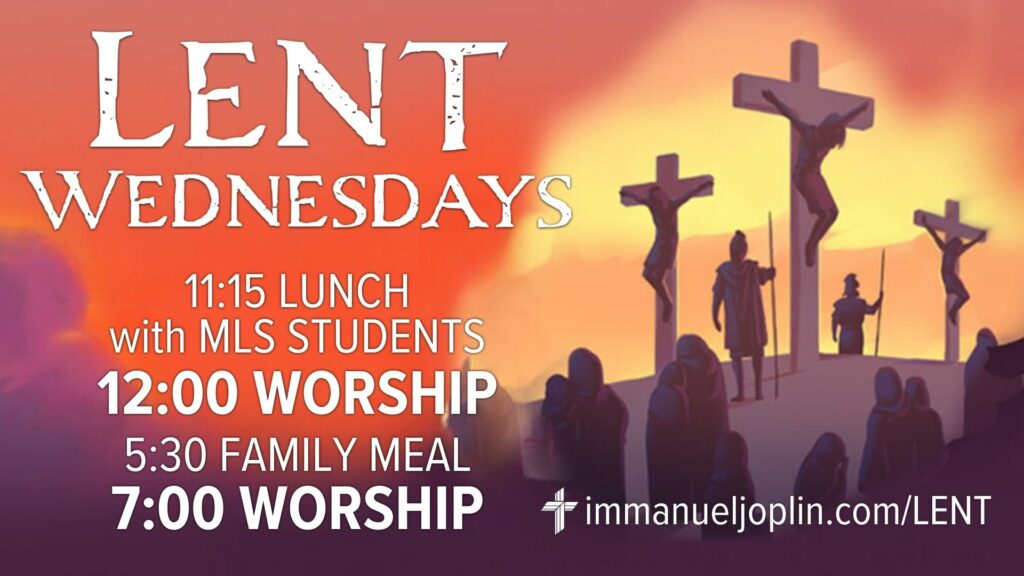FAQs About Lent
What is Lent? Learn about this 40-day season of the church year leading up to Easter (Note: Lent 2024 begins on Wednesday, February 14.)
Q: What is the significance of Lent?
A: Early in the Church’s history, the major events in Christ’s life were observed with special observances, such as His birth, baptism, death, resurrection and ascension. As these observances developed, a period of time was set aside prior to the major events of Jesus’ birth and resurrection as a time of preparation.
During Lent, the Church’s worship assumes a more penitential character. The color for the season is purple, a color often associated with penitence. The “Hymn of Praise” is omitted from the liturgy. The word “Alleluia” is usually omitted as well. By not using the alleluia–a joyful expression meaning “Praise the Lord”–until Easter, the Lenten season is clearly set apart as a distinct time from the rest of the year. Additionally, it forms a powerful contrast with the festive celebration of Jesus’ resurrection when our alleluias ring loud and clear.

Finally, the penitential character of Lent is not its sole purpose. In the ancient Church, the weeks leading up to Easter were a time of intensive preparation of the candidates who were to be baptized at the Easter vigil on Holy Saturday. This time in the Church’s calendar was seen as an especially appropriate time for Baptism because of the relationship between Christ’s death and resurrection and our own in Holy Baptism (see Romans 6:1-11). This focus would suggest that the season of Lent serves not only as a time to meditate on the suffering that Christ endured on our behalf but also as an opportunity to reflect upon our own Baptism and what it means to live as a child of God.
Q: Do Lutherans have to give up something for Lent as some other denominations require?
A: From the perspective of The Lutheran Church-Missouri Synod, “giving something up for Lent” is entirely a matter of Christian freedom. It would be wrong, from our perspective, for the church to make some sort of “law” requiring its members to “give something up for Lent,” since the Scriptures themselves do not require this. If, on the other hand, a Christian wants to give something up for Lent as a way of remembering and personalizing the great sacrifice that Christ made on the cross for our sins, then that Christian is certainly free to do so—as long as he or she does not “judge” or “look down on” other Christians who do not choose to do this.
Q: What is the significance of Ash Wednesday and ashes on the forehead?
A: Lutheran Worship: History and Practice, a commentary on Lutheran Worship, one of our Synod’s hymnals, says this about ashes on Ash Wednesday:
“Other customs may be used, particularly the imposition of ashes on those who wish it. This ancient act is a gesture of repentance and a powerful reminder about the meaning of the day. Ashes can symbolize dust-to-dustness and remind worshipers of the need for cleansing, scrubbing and purifying. If they are applied during an act of kneeling, the very posture of defeat and submission expresses humility before God.”
The use of ashes on Ash Wednesday is a more recent custom among most LCMS congregations, although some have done it for decades. The ashes are usually derived from the burned palms from the previous Palm Sunday. Experience will show, however, that in obtaining ashes this way, it doesn’t take many ashes to “ash” a whole congregation. Like sin, they are very dirty and go a long way. One palm leaf will produce enough ashes for several years. Usually the pastor takes the ashes on the end of his thumb and makes the sign of the cross on the forehead of each worshiper, saying these words: “Remember: you are dust, and to dust you shall return.” This follows most effectively prior (or as part of) the Service Corporate Confession and Absolution on pp. 290-291 of Lutheran Service Book.
Published by: LCMS Church Information Center ©The Lutheran Church—Missouri Synod 1333 S. Kirkwood Road, St. Louis, MO 63122-7295 888-843-5267 • infocenter@lcms.org • www.lcms.org/faqs


One Comment
Do Lutherans celebrate lent? - Christian Faith… Pingback
[…] Facts about Lent […]
Commenting has been turned off.